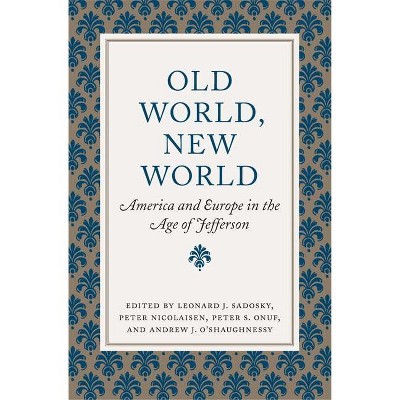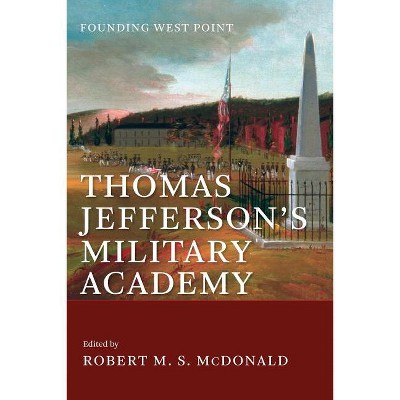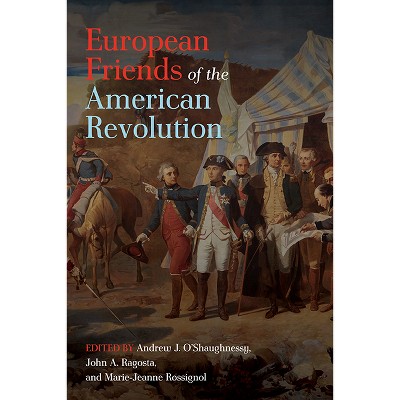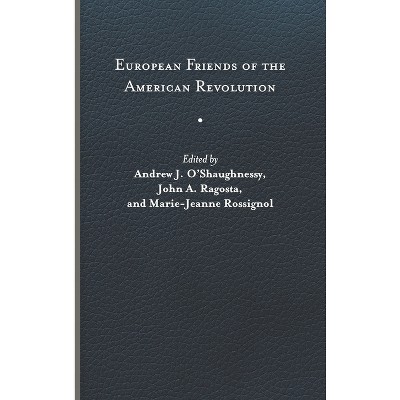The Founding of Thomas Jefferson's University - (Jeffersonian America) by John A Ragosta & Peter S Onuf & Andrew J O'Shaughnessy (Hardcover)

About this item
Highlights
- Established in 1819 by Thomas Jefferson, the University of Virginia was known as "The University" throughout the South for most of the nineteenth century, and today it stands as one of the premier universities in the world.
- About the Author: John A. Ragosta, Historian at the Robert H. Smith International Center for Jefferson Studies at Monticello, is the author of Religious Freedom: Jefferson's Legacy, America's Creed(Virginia), among other works.
- 360 Pages
- Education, Higher
- Series Name: Jeffersonian America
Description
About the Book
Providing a fascinating and important look at the development of one of America's oldest and most preeminent educational institutions, this book provides yet another perspective from which to appreciate the extraordinary contributions of Jefferson in the development of the new nation.Book Synopsis
Established in 1819 by Thomas Jefferson, the University of Virginia was known as "The University" throughout the South for most of the nineteenth century, and today it stands as one of the premier universities in the world. This volume provides an in-depth look at the founding of the University and, in the process, develops new and important insights into Jefferson's contributions as well as into the impact of the University on the history of higher education.
The contributors depict the students who were entering higher education in the early republic--their aspirations, their juvenile and often violent confrontations with authority, and their relationships with enslaved workers at the University. Contributors then turn to the building of the University, including its unique architectural plan as an "Academical Village" and the often-hidden role of African Americans in its construction and day-to-day life. The next set of essays explore various aspects of Jefferson's intellectual vision for the University, including his innovative scheme for medical education, his dogmatic view of the necessity of a "republican" legal education, and the detailed plans for the library by Jefferson, one of America's preeminent bibliophiles. The book concludes by considering the changing nature of education in the early nineteenth century, in particular the new focus on research and discovery, in which Jefferson, again, played an important role. Providing a fascinating and important look at the development of one of America's oldest and most preeminent educational institutions, this book provides yet another perspective from which to appreciate the extraordinary contributions of Jefferson in the development of the new nation.
Review Quotes
"Excellent. This intriguing collection provides current scholarship about Jefferson's plans for the new University of Virginia, connecting the founding of the institution with the lively issues facing UVA in the present and the future. This courageous approach fends off ancestor worship and helps make the historic university and Jefferson's ideas part of a living dialectic."
--John R. Thelin, University of Kentucky, author of American Higher Education: Issues and InstitutionsGuided by Jefferson's belief that every generation must create its own history, these insightful essays narrate the story of the University of Virginia's beginnings and make an important contribution to understanding Jefferson's vision for education's power to produce good citizens.
--Barbara B. Oberg, Princeton University, editor of Women in the American Revolution: Gender, Politics, and the Domestic WorldTaken together, the chapters present Jefferson's own educational experience, his proposed educational reforms, his vision for the university, and the successes and failures of his plans...Jefferson in so many ways embodied not only what is admirable about America (democracy and the search for truth through science), but also what is deplorable about America (racism). This book illustrates this truth as far as Jefferson and the University of Virginia are concerned.
--Stuart Leibiger, Journal of the Early RepublicWhat these essays teach us so well is best said by contributors Ambuske and Flaherty: "Jefferson and his contemporaries could not ignore the past as they shaped the future. Neither can we" (p. 248).
--Mary N. Woods, Journal of Southern HistoryAbout the Author
John A. Ragosta, Historian at the Robert H. Smith International Center for Jefferson Studies at Monticello, is the author of Religious Freedom: Jefferson's Legacy, America's Creed(Virginia), among other works.
Peter S. Onuf, Thomas Jefferson Foundation Professor Emeritus at the University of Virginia, is the author of The Mind of Thomas Jefferson (Virginia), among other works.
Andrew J. O'Shaughnessy, Vice President of the Thomas Jefferson Foundation and Saunders Director of the International Center for Jefferson Studies at Monticello, is the author of The Men Who Lost America: British Leadership, the American Revolution, and The Fate of the Empire, among other works.
Shipping details
Return details
Trending Poetry











